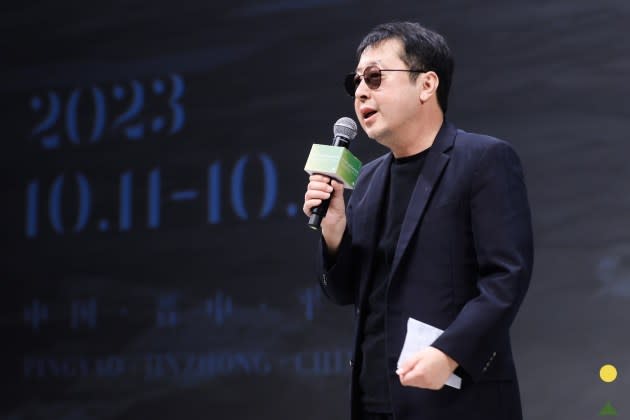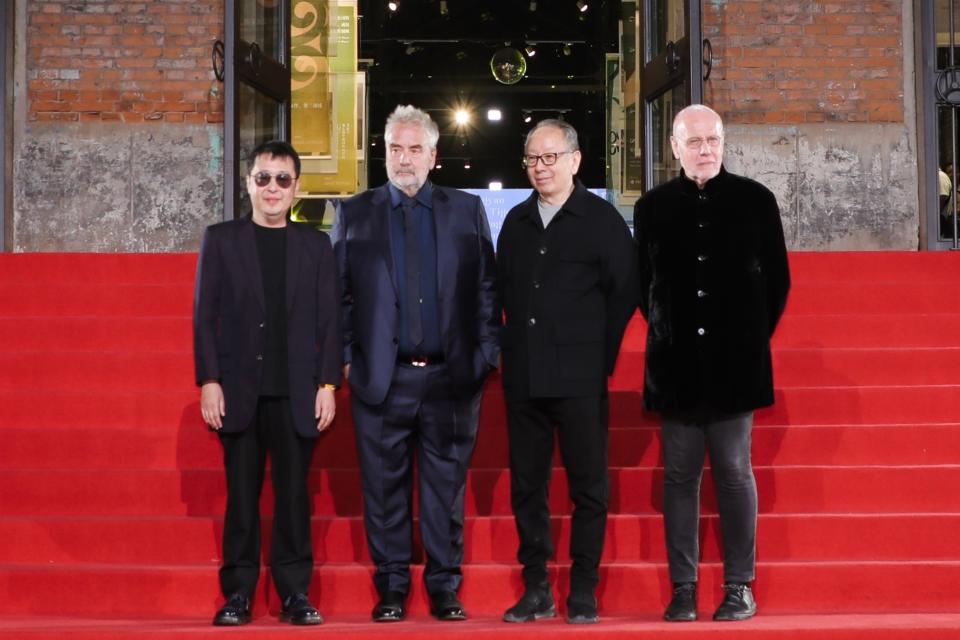Jia Zhangke On Pingyao Film Festival’s Return; New International Film Fund & Upcoming Feature ‘We Shall Be All’
- Oops!Something went wrong.Please try again later.

Chinese filmmaker Jia Zhangke is relieved that the festival he founded in the ancient walled city of Pingyao in China’s Shanxi province is back on track after a tricky few years during the pandemic.
Now in its seventh edition, Pingyao International Film Festival (PYIFF) takes place in a purpose built festival centre, with five screening rooms, exhibition halls and other facilities, inside the stunning UNESCO world heritage site of Pingyao. Lin Xudong, a critic, academic and documentary filmmaker, is artistic director of the festival, with veteran festival director Marco Mueller as chief artistic consultant.
More from Deadline
Choy Ji Talks Shifting Hong Kong-Mainland China Ties In Cross-Border Drama 'Borrowed Time' - Pingyao
Zhang Yu Talks Japan-Set Trauma Survival Drama 'Killing The Violet' - Pingyao
The festival managed to keep going through the pandemic era, last year shifting its dates from October to January, but the centre was often closed for months at a time due to China’s strict Covid regulations. “We had some difficult days – we had to shut down completely for 18 months in the middle of the pandemic but still had 35 members on staff,” says Jia, sitting down with Deadline at the end of the festival. “We made all efforts we could to survive during this period.”
This year he feels the festival has exceeded pre-pandemic levels in terms of the “participation and passion” of the Chinese audience and industry. Screenings were packed and at one point around 370,000 people were trying to buy tickets online.
However, the numbers of foreign directors and producers has still not fully recovered. “Our biggest obstacle was the lack of flights – there are still only a few each week from most destinations,” says Jia. “We’re hoping next year, flight schedules will be back to normal and we can welcome many more young foreign filmmakers here in Pingyao.”
PYIFF has two main competition sections for emerging filmmakers – Hidden Dragons, which focuses on Chinese films, and Crouching Tigers, which selects international works. At the closing ceremony, the festival presented Best Film in the Hidden Dragons section to Wei Shujun’s Only The River Flows, which is currently topping China’s box office, while the top award in Crouching Tigers went to Inside The Yellow Cocoon Shell, from Vietnam’s Pham Thien An.
Also during the closing ceremony, Jia announced the launch of a film fund to support international filmmakers, Wings International, which aims to provide support to about five films a year. The fund’s executive committee is headed by Jacob Wong, director of Hong Kong International Film Festival’s industry programmes; producer and Tokyo film festival programming director Shozo Ichiyama and PYIFF CEO Casper Liang.
“Even before Covid hit we thought about launching a programme to support international directors, but it was put on hold because of the pandemic,” explains Jia. “Our focus will be more on emerging filmmaking countries in Asia, Africa, Eastern Europe and South America, but we aren’t limiting our support to films from those regions. The idea is to support good cinema wherever it originates.”
Jia added that details on the form of support are still being worked out, but it’s likely to be a model where the Wings International fund retains some regional copyright, such as China distribution rights. “We believe this is a simple approach that will not prevent the projects from moving forward and finding other investment,” he says. However, he adds that the fund would still consider films that are not suitable for China release.
The fund builds on the work that PYIFF has already done to support up-and-coming Chinese filmmakers. In addition to films from emerging Chinese talents programmed in the Hidden Dragons section, the festival also runs a projects market, Pingyao Project Promotion (PPP), and screens several programmes of short films. This year, PYIFF arranged special screenings of the short films for Chinese producers and studio execs, in addition to the public screenings.
When asked about the post-pandemic landscape for the Chinese film industry, Jia says the mainstream industry is recovering quickly but that financing for independent and arthouse films remains tough. “It’s a consequence of China’s overall economic performance – young directors had more opportunities when China’s economy was booming, but investment has contracted in the current downturn,” he says.
He adds that his own company, Xstream Pictures, was forced to cut down investment in three or four films a year from new talent to just a few projects over the past few years. One of these, Gao Peng’s crime drama A Long Shot, is receiving its world premiere in competition at the on-going Tokyo International Film Festival.
But he’s optimistic because Chinese filmmakers are resourceful: “One of our award winners this year, Dance Still, was made for just RMB200,000 [around US$30,000]. Young directors always seem to find a way.” He’s also encouraged by the high volume of women filmmakers at the festival, pointing out that several of this year’s prize winners, including Geng Zihan who won best director for A Song Sung Blue, are women, as are around one half of PPP participants.

Meanwhile, China’s censorship situation also appears to have improved since January this year. Jia was one of a group of filmmakers pushing the China Film Bureau to speed up approvals for indie and arthouse films when they stalled almost completely during the pandemic, while more nationalistic local fare was waived through by regulators.
However, since Mao Yu was appointed head of China Film Bureau, the wheels have started turning again for both local and imported titles. Jia’s own company was a co-producer on Thai filmmaker Apichatpong Weerasethakul’s Cannes Jury Grand Prize winner Memoria, but had to wait nearly two years to get approval to release the film in China. It was finally released this spring with no changes, grossing around US$400,000 (RMB2.5M), which made China one of the biggest box office territories for the film.
Jia is also returning to directing this year. On November 10, he will start filming the contemporary sequences of We Shall Be All, which follows a Chinese woman across the first two decades of the 21st century. Starring Jia’s wife and regular collaborator Zhao Tao, the film is produced by Ichiyama and Liang through Jia’s Xstream Pictures. It will be his first fiction feature in five years since Ash Is Purest White (2018), as his last film, Swimming Out Till The Sea Turns Blue (2020), was a documentary about a literary festival in his hometown Fenyang in Shanxi.
He won’t be drawn on the delivery date, but we can probably expect to see the film at a major festival next year. “Post-production will be a complex process because we’re covering a time period from 2001 to the present day,” says Jia, who has tackled China’s rapidly changing landscape in many of his previous films. “There have been many changes in China in the first two decades of this century and we need to figure out how to present that visually.”
Pingyao International Film Festival took place October 11-18.
Best of Deadline
SAG-AFTRA Interim Agreements: Full List Of Movies And TV Series
2023 Premiere Dates For New & Returning Series On Broadcast, Cable & Streaming
Sign up for Deadline's Newsletter. For the latest news, follow us on Facebook, Twitter, and Instagram.

